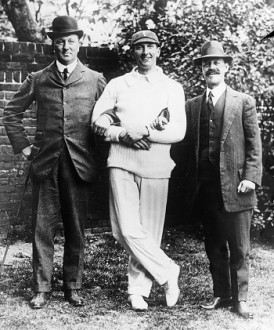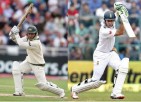Cricket in the Ark 100 Years Ago
Dave Wilson |
Cricketweb is delighted to welcome Patrick Ferriday, author of “Before the Lights Went Out”, our Book of the Year, with an account of the build-up to the 1912 Triangular Tournament and of the tournament itself.
For those of us unfortunate enough to have tramped and splashed through this English ‘summer’, the sun has emerged just in time to crown both the shining pate of Hashim Amla and the luxuriant growth atop Jacques Kallis. Just as we were saying ‘this can’t go on’ (the rain that is, not the runs), it stopped.
Have a small thought then for those poor souls of 1912 and not only those on the Titanic. Just when they thought it couldn’t get any worse (and it had been as bad as 2012), it did. August 1912 topped all but one of the 1200 months of the twentieth century for rainfall in England.
Deftly dodging thunderstorms and freezing under slate grey skies 100 hundred years ago were not two but three international cricket teams because this was the season chosen for the first world championship of cricket, the much vaunted and long-forgotten Triangular Tournament.
Born of the desire of South African ‘Randlord’ Abe Bailey to see his beloved adopted land sit at the top table in a game that had been his consuming passion since well before he made his fortune, the idea was enthusiastically received in England where it was hoped it might, in some small way, draw the Empire together for a trial of strength looming ominously in the mid-distance – war with Germany. By contrast, Australia remained unconvinced by Bailey’s clumsy baiting and the potential loss of an Ashes series and the myriad of burnt pockets that would accompany it.
After five years of wrangling, insults and general tomfoolery, the dates and venues were set and England would be treated to an orgy of Test cricket; no less than nine matches in three months with each side to play one another three times. This being the Edwardian age, nobody thought to establish a scoring system and newspapers were still arguing about the ‘standings’ on the day before the final match. But even as England were bullying Australia in their own garden during the preceding southern summer, the Triangular was steadily falling apart as a spectacle.
A declining South African side could ill-afford to lose its best players but two of the three were nonetheless lost. Percy Sherwell, captain and wicket-keeper was a victim of business commitments (why couldn’t Bailey bung him a bundle?) and wondrous googly bowler Ernie Vogler saw fit to take Bailey to court to recover money withheld from a previous tour where drink had allegedly separated him from his art. In Australia the newly-founded Board of Control was out to live up to its name under iron-fisted martinet Billy McElhone and took on the leading players over money. The ‘Big Six’ refused their invitations and the team was deprived of its pace, backbone, leadership and beauty. Trumper, Hill, Ransford and Cotter would never play Tests again although not even a world war could stop the mighty Warwick Armstrong and redoubtable Hanson Carter from whitewashing the poms in a later age.
Given these preparations, and the weather, it hardly needs telling that the cricket that summer was less than had been hoped for. South Africa were annihilated (SF Barnes 34-382 in three Tests) by both opponents who then lined up for the grand decider over six days on 19 August at the Oval, their previous two meetings having resulted in wet draws. The sun shone intermittently, England’s captain CB Fry was booed to the wicket and the visitors were outplayed and finally beaten by their own bowler, Gerry Hazlitt, producing a spell of five wickets for one run just when it was the last thing needed.
And then the chastened tourists slipped away, South Africa to face questions on their ability and some Australians to be quizzed as to their drinking and general larrikin behaviour. The wonder was that such great players as Bardsley, Hobbs, Faulkner, Rhodes, Macartney and Barnes had been able to leave behind such striking evidence of their timeless magnificence. A soggy summer maybe but still a unique cricketing season.





Entertaining read. I could not but help notice that our captain used a cane….
Comment by Quaggas | 12:00am BST 4 August 2012
Indeed. Great man.
Comment by Quaggas | 12:00am BST 4 August 2012
Indeed. One of the greatest.
Comment by Monk | 12:00am BST 4 August 2012